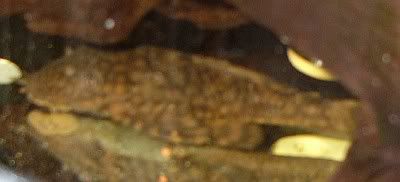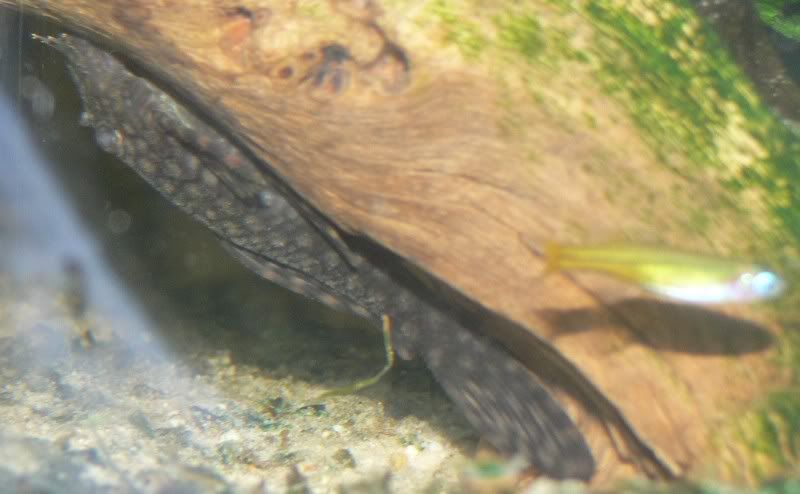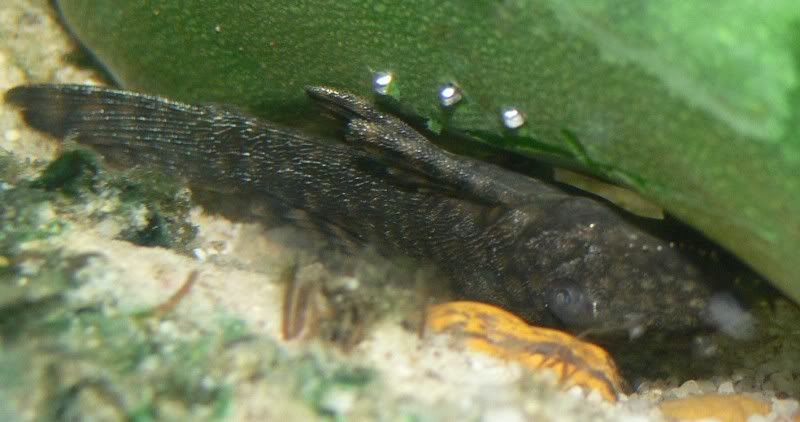Ancistrus ID needed
- Andre Costerus
- Posts: 24
- Joined: 22 Sep 2005, 14:11
- Location 1: Cape Town - South Africa
Ancistrus ID needed
Hi There
I would really appreciate it if someone can help me to identify the following ancistrus. I bought two of them from the lfs. Unfortunately the female I booked along with the two males jumped the tank the day before I picked them up.
http://www.planetcatfish.com/forum/albu ... pic_id=225
http://www.planetcatfish.com/forum/albu ... pic_id=224
I would really appreciate it if someone can help me to identify the following ancistrus. I bought two of them from the lfs. Unfortunately the female I booked along with the two males jumped the tank the day before I picked them up.
http://www.planetcatfish.com/forum/albu ... pic_id=225
http://www.planetcatfish.com/forum/albu ... pic_id=224
- Silurus
- Posts: 12420
- Joined: 31 Dec 2002, 11:35
- I've donated: $12.00!
- My articles: 55
- My images: 893
- My catfish: 1
- My cats species list: 90 (i:1, k:0)
- Spotted: 424
- Location 1: Singapore
- Location 2: Moderator Emeritus
- Andre Costerus
- Posts: 24
- Joined: 22 Sep 2005, 14:11
- Location 1: Cape Town - South Africa
- pureplecs
- Posts: 160
- Joined: 18 Sep 2005, 17:57
- I've donated: $40.00!
- My images: 5
- My cats species list: 29 (i:0, k:0)
- My aquaria list: 12 (i:0)
- Spotted: 5
- Location 2: USA, Florida
Re: Ancistrus ID needed
How does a common bn jump a tank???Andre Costerus wrote:Hi There
Unfortunately the female I booked along with the two males jumped the tank the day before I picked them up.
.....
-
Mike_Noren
- Posts: 1395
- Joined: 25 Jul 2003, 21:40
- I've donated: $30.00!
- My articles: 1
- My images: 37
- My cats species list: 5 (i:0, k:0)
- Spotted: 9
- Location 1: Sweden
- Location 2: Sweden
-
Zebrapl3co
- Posts: 64
- Joined: 22 Sep 2005, 15:13
- Location 1: Toronto, ON
It's a BN pleco alright. But I am not too sure about the patterns. I think there should be sub catagories to SP3, because I've seen 3 different pattern variations that are grouped in to SP3.
I think some one up here; where I live was, trying to name it the Goldspotted BN pleco. If you ever find a long fin BN pleco, you'll see some resemblence there. It's also possible that these have been selectively breed to look like that, but it's orginal ancestry might be an SP3. You should ask about the origin of where these guys come from.
I think some one up here; where I live was, trying to name it the Goldspotted BN pleco. If you ever find a long fin BN pleco, you'll see some resemblence there. It's also possible that these have been selectively breed to look like that, but it's orginal ancestry might be an SP3. You should ask about the origin of where these guys come from.
- Andre Costerus
- Posts: 24
- Joined: 22 Sep 2005, 14:11
- Location 1: Cape Town - South Africa
Hi and thanks for the feedback
I have taken a picture of one of these guys next to a sp3. They are slightly lighter in colour and still have the same spots since the last pics.
One thing I have also noticed is that they dont have white edges to the fins.

I have looked through my copy of the DATZ L-Numbers and the fish quite closely match the picture of Ancistrus pirareta on page 29.
I have taken a picture of one of these guys next to a sp3. They are slightly lighter in colour and still have the same spots since the last pics.
One thing I have also noticed is that they dont have white edges to the fins.

I have looked through my copy of the DATZ L-Numbers and the fish quite closely match the picture of Ancistrus pirareta on page 29.
- Shane
- Expert
- Posts: 4625
- Joined: 30 Dec 2002, 22:12
- My articles: 69
- My images: 162
- My catfish: 75
- My cats species list: 4 (i:75, k:0)
- My aquaria list: 4 (i:4)
- Spotted: 99
- Location 1: Tysons
- Location 2: Virginia
- Contact:
Andre,
Any chance you could find out where they were imported from? That would really help. Can't be too many folks importing South American Fishes to South Africa. I believe there is a direct Brazil-South Africa flight, so that could be one source. They do not look like A. pirata to me. These seem to have much more of a wavy pattern to the fins than the A. pirata in DATZ or Welse Atlas.
-Shane
Any chance you could find out where they were imported from? That would really help. Can't be too many folks importing South American Fishes to South Africa. I believe there is a direct Brazil-South Africa flight, so that could be one source. They do not look like A. pirata to me. These seem to have much more of a wavy pattern to the fins than the A. pirata in DATZ or Welse Atlas.
-Shane
"My journey is at an end and the tale is told. The reader who has followed so faithfully and so far, they have the right to ask, what do I bring back? It can be summed up in three words. Concentrate upon Uganda."
Winston Churchill, My African Journey
Winston Churchill, My African Journey
- Andre Costerus
- Posts: 24
- Joined: 22 Sep 2005, 14:11
- Location 1: Cape Town - South Africa
- MatsP
- Posts: 21038
- Joined: 06 Oct 2004, 13:58
- My articles: 4
- My images: 28
- My cats species list: 117 (i:33, k:0)
- My aquaria list: 10 (i:8)
- My BLogs: 4 (i:0, p:97)
- Spotted: 187
- Location 1: North of Cambridge
- Location 2: England.
It's POSSIBLE that they came from a fish-farm in Brazil, but it's much more likely that they were wild-caught. Brazil (and the rest of south-america) isn't big on farming fish - it's quite labour intensive, and you can just as well spend the energy on collecting wild fish as farming them. Most farmed fish come from Malaysia, Taiwan and that area.
If you CAN find out from the wholesaler at least which place in Brazil they came from, that would help...
--
Mats
If you CAN find out from the wholesaler at least which place in Brazil they came from, that would help...
--
Mats
- Shane
- Expert
- Posts: 4625
- Joined: 30 Dec 2002, 22:12
- My articles: 69
- My images: 162
- My catfish: 75
- My cats species list: 4 (i:75, k:0)
- My aquaria list: 4 (i:4)
- Spotted: 99
- Location 1: Tysons
- Location 2: Virginia
- Contact:
That was what I thought and Mats is right that they surely did not come from a "farm." That was likely a Portugese/English mistranslation. Basically your answer then is that you have an Ancistrus sp. from Brazil. I doubt we will ever get further than that.
-Shane
-Shane
"My journey is at an end and the tale is told. The reader who has followed so faithfully and so far, they have the right to ask, what do I bring back? It can be summed up in three words. Concentrate upon Uganda."
Winston Churchill, My African Journey
Winston Churchill, My African Journey
- Andre Costerus
- Posts: 24
- Joined: 22 Sep 2005, 14:11
- Location 1: Cape Town - South Africa
- Andre Costerus
- Posts: 24
- Joined: 22 Sep 2005, 14:11
- Location 1: Cape Town - South Africa
Some Time later
Hi Guys
Here is 2 updated pictures of the fish listed before.
Any ideas?

Side view (sorry for the quality)

The bristles are not growing as fast as I would hav thought either
Here is 2 updated pictures of the fish listed before.
Any ideas?

Side view (sorry for the quality)

The bristles are not growing as fast as I would hav thought either
-
Mike_Noren
- Posts: 1395
- Joined: 25 Jul 2003, 21:40
- I've donated: $30.00!
- My articles: 1
- My images: 37
- My cats species list: 5 (i:0, k:0)
- Spotted: 9
- Location 1: Sweden
- Location 2: Sweden
- Andre Costerus
- Posts: 24
- Joined: 22 Sep 2005, 14:11
- Location 1: Cape Town - South Africa
- Andre Costerus
- Posts: 24
- Joined: 22 Sep 2005, 14:11
- Location 1: Cape Town - South Africa
- MatsP
- Posts: 21038
- Joined: 06 Oct 2004, 13:58
- My articles: 4
- My images: 28
- My cats species list: 117 (i:33, k:0)
- My aquaria list: 10 (i:8)
- My BLogs: 4 (i:0, p:97)
- Spotted: 187
- Location 1: North of Cambridge
- Location 2: England.
You didn't by any chance find out WHERE in Brazil it came from?
A. pirareta could be a choice, but that's most likely if it was exported from Southern Brazil (Rio de Janeiro area or so). Although comparing the pictures of with the picture of your fish, it doesn't match well - the colours are quite different...
What size is the fish now?
Other Ancistrus (according to CLOFFSCA) from Brazil:
A. aquaboensis
A. brevispinnis
A. claro
A. cryptophthalmus
A. cuiabae
A. damasceni
A. dolichopterus
A. dubius
A. formoso
A. fulvus
A. hoplogenys
A. latifrons
A. maculatus
A. minutus
A. multispinis
A. stigmaticus
A. taunayi
That's the ones that have been scientifically described - and not all of them are in the Cat-eLog at the moment. Aqualog/DATZ lists several L-numbers that may or may not be in the list above, and there are probably a fair number of other Ancistrus species that haven't even got L-numbers - your fish can fall into any of the three categories (described, L-numbered awaiting description or not-L-numbered). Unfortunately, many of the original descriptions from late 19th or early 20th century [or earlier] aren't very detailed and often based on preserved specimens - so the natural colouration may not be described and if it's not a detailed description, it can be very difficult to tell which species something is from just the description...
I think Shane has said that would probably be a unique species of Ancistrus for every larger river in South America - there may be MANY undescribed species if that's the case...
Finding out MORE about exactly where it was exported from would be a start - it will at least eliminate some species on that list.
--
Mats
A. pirareta could be a choice, but that's most likely if it was exported from Southern Brazil (Rio de Janeiro area or so). Although comparing the pictures of with the picture of your fish, it doesn't match well - the colours are quite different...
What size is the fish now?
Other Ancistrus (according to CLOFFSCA) from Brazil:
A. aquaboensis
A. brevispinnis
A. claro
A. cryptophthalmus
A. cuiabae
A. damasceni
A. dolichopterus
A. dubius
A. formoso
A. fulvus
A. hoplogenys
A. latifrons
A. maculatus
A. minutus
A. multispinis
A. stigmaticus
A. taunayi
That's the ones that have been scientifically described - and not all of them are in the Cat-eLog at the moment. Aqualog/DATZ lists several L-numbers that may or may not be in the list above, and there are probably a fair number of other Ancistrus species that haven't even got L-numbers - your fish can fall into any of the three categories (described, L-numbered awaiting description or not-L-numbered). Unfortunately, many of the original descriptions from late 19th or early 20th century [or earlier] aren't very detailed and often based on preserved specimens - so the natural colouration may not be described and if it's not a detailed description, it can be very difficult to tell which species something is from just the description...
I think Shane has said that would probably be a unique species of Ancistrus for every larger river in South America - there may be MANY undescribed species if that's the case...
Finding out MORE about exactly where it was exported from would be a start - it will at least eliminate some species on that list.
--
Mats
- Andre Costerus
- Posts: 24
- Joined: 22 Sep 2005, 14:11
- Location 1: Cape Town - South Africa
Thanks for the reply Mats
The fish is now around 10cm total length. I have tried my best to find out where it came from but the suppliers here are very secretive. They also listed the fish as bristlenose catfish so I dont have much hope of ever finding out where it came from.
I'm quite happy with them though, they are very nice looking fish.
The fish is now around 10cm total length. I have tried my best to find out where it came from but the suppliers here are very secretive. They also listed the fish as bristlenose catfish so I dont have much hope of ever finding out where it came from.
I'm quite happy with them though, they are very nice looking fish.
- Andre Costerus
- Posts: 24
- Joined: 22 Sep 2005, 14:11
- Location 1: Cape Town - South Africa
- pureplecs
- Posts: 160
- Joined: 18 Sep 2005, 17:57
- I've donated: $40.00!
- My images: 5
- My cats species list: 29 (i:0, k:0)
- My aquaria list: 12 (i:0)
- Spotted: 5
- Location 2: USA, Florida
- MatsP
- Posts: 21038
- Joined: 06 Oct 2004, 13:58
- My articles: 4
- My images: 28
- My cats species list: 117 (i:33, k:0)
- My aquaria list: 10 (i:8)
- My BLogs: 4 (i:0, p:97)
- Spotted: 187
- Location 1: North of Cambridge
- Location 2: England.
Quite possible... It's unlikely (but by far not impossible) that South Africa are getting fish that aren't being exported to other locations, so one likely candidate is some L-numbered species.pureplecs wrote:Couldn't it be a L110 Red Spot Ancistrus???
A. lineolatus is listed in CLOFFSCA as 9 cm SL (so perfectly fine with 10cm TL), it's from Orteguaza River Basin in upper Japura River drainage, in Columbia. Looking at a Map of Japura River in Encarta shows a river that flows across the Columbian border into Brazil... (whether that's the right river or not is a good question, it's not uncommon for several rivers to have the same name in South America - combination of lack of imagingation, lack of GPS in the past, and common/similar language makes it all more likely to get several rivers with the same/similar name). Not a million miles from Manaus that is a big fish exporting location, so it makes sense from that perspective as well.
However, without further evidence in it's favour, I wouldn't just call it A. lineolatus simply based on where it came from. If we had a picture of A. lineolatus (that is CERTAINLY that fish - not just a guess) or some detailed description, then it would help a whole lot... Does anyone have Fowler 1943, A collection of fresh-water fishes from Colombia ,... Proc. Acad. Nat. Sci. Philadelphia ?
--
Mats
- Andre Costerus
- Posts: 24
- Joined: 22 Sep 2005, 14:11
- Location 1: Cape Town - South Africa
Hi again mats
The new fish match the old ones very closely, especially since the stress colouration has faded.
Here are pictures of the two fish:


The dealer I bought these from is much more helpfull and I am hoping that he can confirm where they were imported from.
I also found these picture on scotcat.com:
http://www.scotcat.com/loricariidae/anc ... sp_l88.htm
They dont really look like the pictures of L088 in my DATZ book or the ones on Planetcatfish, but the female picture is a close match to the body shape of my fish.
The new fish match the old ones very closely, especially since the stress colouration has faded.
Here are pictures of the two fish:


The dealer I bought these from is much more helpfull and I am hoping that he can confirm where they were imported from.
I also found these picture on scotcat.com:
http://www.scotcat.com/loricariidae/anc ... sp_l88.htm
They dont really look like the pictures of L088 in my DATZ book or the ones on Planetcatfish, but the female picture is a close match to the body shape of my fish.
- Andre Costerus
- Posts: 24
- Joined: 22 Sep 2005, 14:11
- Location 1: Cape Town - South Africa
Message from the supplier:
My supplier says that those lineolatus come from either Belem or Manaus in Brazil, they are wild caught.He thinks they are from belem because the ones found there have paler markings.
As far as I know the lineolatus comes from Guyana, but I also know that the fish are very widespread and can occur from other joining rivers.
hope this helps you
My supplier says that those lineolatus come from either Belem or Manaus in Brazil, they are wild caught.He thinks they are from belem because the ones found there have paler markings.
As far as I know the lineolatus comes from Guyana, but I also know that the fish are very widespread and can occur from other joining rivers.
hope this helps you
- Andre Costerus
- Posts: 24
- Joined: 22 Sep 2005, 14:11
- Location 1: Cape Town - South Africa
some update pictures of the fish:

[IMG:800:731]http://i31.photobucket.com/albums/c398/ ... rus2-1.jpg[/img]
[IMG:800:433]http://i31.photobucket.com/albums/c398/ ... rus1-1.jpg[/img]

[IMG:800:731]http://i31.photobucket.com/albums/c398/ ... rus2-1.jpg[/img]
[IMG:800:433]http://i31.photobucket.com/albums/c398/ ... rus1-1.jpg[/img]








